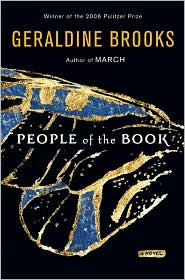
The follow-up to the Pulitzer Prize winner’s book “March” in 2006, “People of the Book” is another of Geraldine Brooks’s intricately woven historical novels. In it, Brooks spins a fictional tale based on the spare details known about the real-life medieval artifact, the Sarajevo Haggadah, one of the oldest Jewish illuminated texts, whose survival through centuries of wars and purges seems nothing short of “a series of miracles.”
It’s narrated in part by Hanna, a rare book conservator hired in 1996 by the United Nations to inspect and restore the ancient Haggadah so it can be put on exhibit. Under examination, Hanna finds various clues in the book to its history, whereabouts and guardians, including an insect’s wing, wine stains, a white hair and salt crystals.
As Hanna pursues unraveling these mysteries, alternate chapters of the novel flash back to various points in the Haggadah’s history and those who possessed it during such turbulent times as: Sarajevo 1940, Vienna 1894, Venice 1609, Tarragona 1492 and Seville 1480. “Inquisition, Nazis, extremist Serb nationalists … the book at this point bears witness to all that,” says one of Hanna’s colleagues.
Indeed, yet the Sarajevo Haggadah also bears witness to those of various faiths who risked their lives to save it from destruction: including a Muslim, Dervis Korbut (his real name), who saved it from the Nazis in 1941; a Catholic priest, Vistorini, who spared its burning during the Inquisition around 1609; and another Muslim, Enver Imamovic (his real name), who hid it in a bank vault during the Bosnian War of the 1990s.
The flashback chapters are consistently rich in detail of the eras and lives of those who heralded the Haggadah. For the most part, the novel is a suspenseful, at times harrowing read, retracing the persecution of the Jews and the Haggadah’s many close calls, as well as Hanna’s contemporary challenges as its conservator. It seems a faster moving novel than Brooks’s “March,” with a bit more to it as well. Only at times does Brooks’s elaborate story lose readers among its many characters and eras, with some abrupt transitions requiring readers to stay quite focused. It’s not exactly your airhead beach read. It packs a lot in in the span of a few hundred pages.
Only in a couple instances did I think that Brooks was stretching it a bit to become a Jewish type of “Da Vinci Code” thriller. Mostly, “People of the Book” doesn’t get that crazy. Despite occasional quirks, Brooks weaves a memorable Sarajevo Haggadah story that stays true to its source.
ps. Apparently Catherine Zeta Jones has acquired the film rights to “People of the Book.” But how you make a film out of it, is anyone’s guess.
